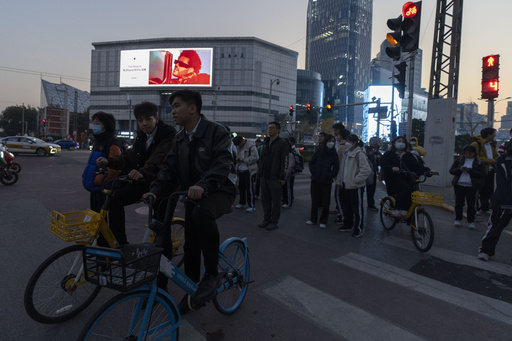
TAIPEI, Taiwan — The initial encounter between China and Donald Trump during his first term was marked by a trade conflict, a diplomatic incident involving Taiwan’s prior leader, and a friendship between the two leaders that ultimately deteriorated. As Trump gears up for his second term as President, China is preparing for a potentially turbulent era in its interactions with the United States, particularly concerning trade, technology, and Taiwan-related issues.
A significant concern for China, should Trump fulfill his campaign pledges, is the potential for a sweeping imposition of 60% tariffs on all Chinese goods exported to the U.S. Such tariffs could severely impact China’s already precarious economy, which faces high rates of youth unemployment along with ongoing property market difficulties and substantial government debt. According to early assessments from UBS, a 60% tariff could lead to a reduction of approximately 2.5 percentage points in China’s expected economic growth, halving the anticipated performance.
During Trump’s first presidency, the United States levied tariffs on more than $360 billion worth of Chinese goods, which prompted China to engage in negotiations. In 2020, a trade agreement was reached, where China pledged to enhance intellectual property protections and purchase an additional $200 billion in American products. However, subsequent investigations indicated that China had significantly fallen short of those commitments. President Joe Biden has upheld most of these tariffs while also introducing new duties on imports, such as steel and electric vehicles, this year.
Experts suggest that tariffs could again serve as leverage to draw Beijing back to discussion tables. Henry Gao, a law scholar at Singapore Management University with a focus on international trade, noted that Beijing may be more inclined to negotiate given its frail economic situation now. He expressed optimism that while tariffs might adversely affect China’s economy in the short term, conditions could improve once negotiations resume.
The approach to trade discussions may involve Trump urging Chinese President Xi Jinping to assist in resolving the conflict in Ukraine, a claim Trump has confidently asserted without detailing how he would achieve this. In the past, Trump solicited Xi’s support regarding the North Korean crisis, and this dynamic could mirror the upcoming interactions, particularly concerning trade and global crises resolution, as suggested by Wang Huiyao, founder of a Beijing think tank.
In a more extreme scenario, Trump warned of imposing even steeper tariffs—ranging from 150% to 200%—on Chinese goods if there were to be a military invasion of Taiwan, a self-governing democracy that Beijing asserts is part of its territory. While the U.S. does not officially recognize Taiwan as an independent nation, it remains its most robust ally and primary supplier of military equipment. Trump sparked tensions with Beijing in December 2016 by accepting a congratulatory phone call from Taiwan’s then-president, Tsai Ing-wen, marking the first direct communication between a U.S. president and a Taiwanese leader since the 1979 establishment of U.S.-China relations.
Experts predict that Trump will likely maintain a balanced stance, supporting existing arrangements between Taiwan and China. Zhu Feng, an authority in international relations at Nanjing University, expressed skepticism about Trump shifting toward endorsing Taiwan independence. China continues to issue warnings regarding potential annexation of Taiwan, while Trump recently claimed that he wouldn’t need military intervention to counter any blockade on Taiwan, asserting a personal rapport with Xi. Trump’s comments have ranged from maintaining a cautious camaraderie with Xi to proposing that Taiwan compensate the U.S. for its defense, equating the dynamics to an insurance relationship.
The geopolitical complexities extend further into the realm of technology. Trump’s presidency was characterized by a focus on national security regarding Chinese technology companies, especially Huawei. President Biden has continued this trajectory, imposing restrictions on China’s access to essential semiconductors crucial for strategic advancements such as artificial intelligence.
Despite Biden’s efforts to bolster domestic semiconductor production through the CHIPS and Science Act, which allocated $53 billion for manufacturing expansion, Trump has criticized the initiative. He has accused Taiwan of having “stolen” the chip industry from the U.S. in past decades. Currently, Taiwan produces nearly 90% of advanced semiconductor chips, and its largest manufacturer, TSMC, has begun increasing production in Arizona partly in response to U.S. policies and to brace for any protectionist measures.
There is concern among analysts that rather than acting as a protective buffer, Taiwan’s chip industry dominance may exacerbate tensions between itself and Trump, as the success of its semiconductor sector may evoke narratives of the U.S. being exploited. Thus, as international relations evolve, the intersection of trade, technology, and diplomacy remains a critical area to monitor.
